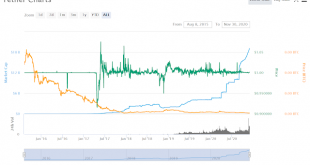Yesterday, the SEC issued a Wells notice to the stablecoin issuer Paxos, warning it that the SEC intended to take legal action against it for issuing an unregistered security. The security in question is the fully-reserved stablecoin BUSD (Binance USD), which Paxos issues expressly for use on the Binance crypto exchange. The Wells notice doesn't apply to Paxos's other fully-reserved stablecoin, USDP, which it issues for use on its own platform. A few hours later, the New York Department of...
Read More »The asymmetric mechanics of Tether
Tether is the issuer of the cryptocurrrency world's premier stablecoin, USDT. Stablecoins aim to guarantee the value of cryptocurrencies in dollar terms, hedging volatility risk and making it easier to realise notional gains from cryptocurrency's wild price rises. But Tether's relationship with the main cryptocurrencies, particularly Bitcoin, is controversial. There is a raging battle between those who think that USDT issuance pumps up the price of Bitcoin, and those who argue that USDT...
Read More »The asymmetric mechanics of Tether
Tether is the issuer of the cryptocurrrency world's premier stablecoin, USDT. Stablecoins aim to guarantee the value of cryptocurrencies in dollar terms, hedging volatility risk and making it easier to realise notional gains from cryptocurrency's wild price rises. But Tether's relationship with the main cryptocurrencies, particularly Bitcoin, is controversial. There is a raging battle between those who think that USDT issuance pumps up the price of Bitcoin, and those who argue that USDT...
Read More »2020 “Globie”: The Carry Trade
by Joseph Joyce 2020 “Globie”: The Carry Trade It is time to announce the recipient of this year’s “Globie”, i.e., the Globalization Book of the Year. The award gives me a chance to draw attention to a book that is particularly insightful about some aspect of globalization. This year’s winner is The Rise of Carry: The Dangerous Consequences of Volatility Suppression and the New Financial Order of Decaying Growth and Recurring Crisis by Tim Lee, Jamie...
Read More »Britain was not “nearly bust” in March
"Britain nearly went bust in March, says Bank of England", reads a headline in the Guardian. In similar vein, the Telegraph's Business section reports "UK finances were close to collapse, says Governor":Eh, what? The Governor of the Bank of England says the UK nearly turned into Venezuela? Well, that's what the Telegraph seems to think: The Bank of England was forced to save the Government from potential financial collapse as markets seized up at the height of the coronavirus crisis,...
Read More »Britain was not “nearly bust” in March
"Britain nearly went bust in March, says Bank of England", reads a headline in the Guardian. In similar vein, the Telegraph's Business section reports "UK finances were close to collapse, says Governor":Eh, what? The Governor of the Bank of England says the UK nearly turned into Venezuela? Well, that's what the Telegraph seems to think: The Bank of England was forced to save the Government from potential financial collapse as markets seized up at the height of the coronavirus crisis,...
Read More »Weird Is Normal
This post was originally published on Pieria in December 2013. Since then, the idea that the long-term real equilibrium interest rate must be equal to or lower than the long-term sustainable growth rate has become much more mainstream. I am just amazed that anyone ever thought it could be otherwise. A long-term real interest rate persistently above the sustainable growth rate cannot possibly be an "equilibrium" rate. As I show in this piece, it can only be maintained through rising...
Read More »Jerome H. Powell — The Federal Reserve’s Framework for Monitoring Financial Stability
It is a pleasure to be back at the Economic Club of New York. I will begin by briefly reviewing the outlook for the economy, and then turn to a discussion of financial stability. My main subject today will be the profound transformation since the Global Financial Crisis in the Federal Reserve's approach to monitoring and addressing financial stability. Today marks the publication of the Board of Governors' first Financial Stability Report. Earlier this month, we published our first...
Read More »Arithmetic for Austrians
This piece grew from a number of conversations with people of Austrian economic persuasion, mostly Bitcoiners and goldbugs (which these days seem mysteriously to have converged). I thought of calling this "Monetarism for goldbugs", but decided to preserve the mathematical slant of the previous pieces in this series. But it's monetary arithmetic, of course. And as Austrians tend to obsess about "sound money", it is specifically sound monetary arithmetic. (Note: Someone has pointed out on...
Read More »Probability for geeks
The Lightning network is being touted as the solution to Bitcoin's scaling problems. If lots of transactions can be taken off the main chain, the thinking goes, then Bitcoin can still take over the world despite its considerable performance problems. Lightning enthusiasts say that when fully enacted, the network will be able to process millions of transactions at, er, lightning speed, without compromising decentralisation, security or transparency.But there are dissenting voices. For...
Read More » Heterodox
Heterodox








